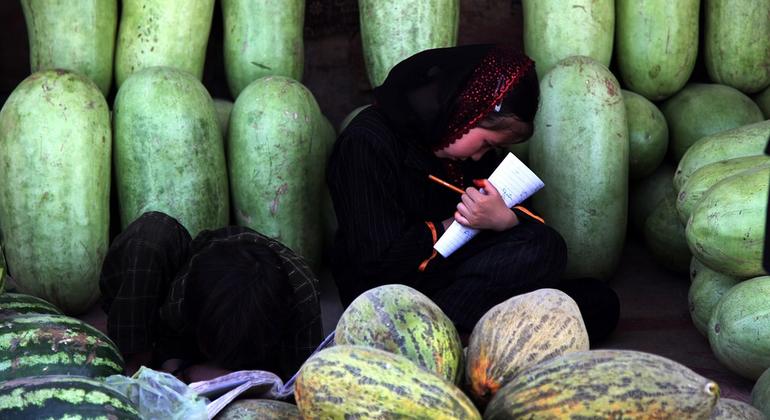Afghanistan: UN predicts restrictions on women’s rights will exacerbate economic disaster

The Afghanistan Socio-Economic Outlook 2023released by the United Nations Development Program (UNDP), which provides an overview of the consequences of the takeover of Afghanistan by today’s de facto rulers, the Taliban, in August 2021.
Soon after the Taliban took power, Afghanistan’s economy collapsed, plunging Afghanistan into decades of poverty; With a population estimated by the United Nations at around 40 million people and a GDP of $14.3 billion in 2021, Afghanistan has one of the lowest per capita incomes in the world, with around 85% population is estimated to be living below the poverty line. .

Displaced children living in Khoshi district, Afghanistan receive cleaning kits.
Too much reliance on international aid
While the report points to some encouraging signs (increased exports, expected 8% increase in domestic revenue, exchange rate stability and lower inflation), the report explains that this largely thanks to large-scale international efforts. aid grants ($3.7 billion in 2022, of which $3.2 billion is provided by the United Nations) to be sent to Afghanistan by 2022.
This does not indicate a long-term recovery: per capita income is expected to fall this year and 2024: UNDP model shows that, if aid falls by 30%, inflation could hit 10% by 2024 and median income could fall 40% percent.
Any cut in international aid would worsen Afghanistan’s economic outlook and extreme poverty would persist for decades: therefore, the call for UN aid is worth it $4.6 billion in international assistance by 2023 is the bare minimum needed to help Afghans in need.
No escape from poverty without women at work

Surayo Buzurukova, UNDP Deputy Resident Representative in Afghanistan, told UN News that the Taliban’s decision to highly restrict women’s ability to study and work is an important reason for the economic hardships of women. country.
“We ran simulations to see how removing women from the workforce would affect the economy in the future,” Ms. Buzurukova said. “We calculated that growth and poverty reduction would not be possible without women. That’s the message we try to convey when we talk to the actual authorities.”
Ms. Buzurukova remains hopeful that the situation will eventually be less oppressive for women, especially in the provinces where there is a high need for female aid workers’ support.
“After August 2021, it is difficult to work here and it takes time to be able to fight the Taliban and make sure they listen to me. But now I have built a network of trust with senior members of the government in fact, at the provincial as well as national level; it is very important that they understand the importance of women to the economy.
We continue to provide services across the country, through our NGO partners, and we have waivers for the health and education sectors, where women can continue to work, but all However, the ban was a challenge and employee morale suffered.”

A child is vaccinated against polio during a polio campaign in Kandahar, Afghanistan.




